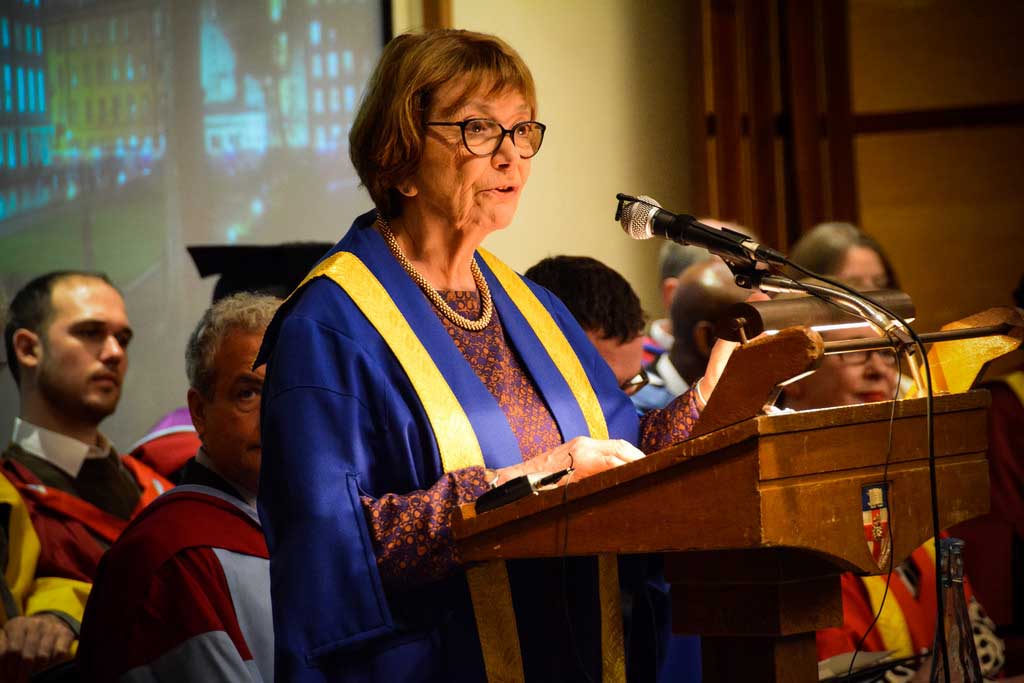Baroness Bakewell, President of Birkbeck, addresses the College’s newest graduates as she congratulates them on their achievements during Graduation Week.
In her speech, she emphasises that the upheavals of a changing world and the UK’s withdrawal from the European Union should not be allowed to stand in the way of knowledge-sharing and education, and how our new graduates can help to break down borders.
It is always a great pleasure to be with you here and offer my congratulations to you on your success. This is a day you will always remember; a watershed in your lives, your careers, that will have a lasting influence on how you live your future life – where you go, what you do and. most importantly, what satisfaction it brings you.
When I look out across a sea of faces and listen to your names, I am impressed by the range and diversity of our graduates. As for your names – you may notice that I try to catch the first name of each of you as I meet you as you cross the platform. That’s because each of you matters individually to Birkbeck. It’s not always easy; I can’t always get it right. There are some names that are not familiar to my own background in the north of England. But even as I hesitate in my wish to get it right, I take pleasure in knowing what a global reach Birkbeck has. I am always delighted to speak with those of you from places across the world. Birkbeck embraces you within its academic fold. And that goes too for my fellow Europeans.
Indeed, I want to say something more about this sense of belonging and the barriers that inhibit it. These are troubled times, when matters of identity – who you are and where you came from – are increasingly used to define and, indeed, restrict what you can do, where you can work and where you can make your home. The whole of Europe – and indeed the larger world – has a long history of men who drew lines on maps and made laws giving power to those lines. We are the inheritors of those maps, and we both thrive and suffer because of them. Not just in Europe but across the Middle East, Africa, the Indian subcontinent, the Americas – tribes of mankind have settled and developed, have lived within those lines and traded across them. They are the nation states we have today.
I, the people on this platform and all of you enjoy crossing those lines. As a young student long ago I remember being woken in the night on the train south by a man in uniform demanding my passport and shouting: “We are now crossing into Switzerland.” I was thrilled. At the first station I got out to buy fresh Swiss coffee and cakes. It was all so new. I had grown up in a country at war so, of course, only the servicemen of our armed forces got to travel abroad. France, Belgium, Holland and beyond were all occupied by the Germans. I got my first taste of crossing a frontier when I went to France at the age of 16.
I offer these personal reminiscences to show just how much times have changed. And then something important happened: the foundations of what we today call the European Union were created. And something happened in our family, too. Something I had never seen before: my father wept. He wept with joy that never, never again would there be war on the continent of Europe such as he had seen twice in his lifetime: the First World War with its death toll of 17 million. And the Second World War, including the war in the Pacific, with over 50 million dead.
He cried for himself and for his children: they would inherit a safer, more coherent Europe. And so it came about.
But wars did happen, and barriers took on a new significance. In the Middle East, and across Africa, people fled their homelands, crossed legal lines between countries to seek refuge from conflict or to seek a better life for themselves. They crossed frontiers in their millions and, in so doing, changed not only their own lives but the lives of those from whom they sought asylum. One of the outcomes of these shifts has created the world we have today: a world at odds with itself, finding it hard to formulate new rules by which to live – and, incidentally, defying the precepts of many of the world’s great religions which is always to “welcome the stranger”; make him welcome within your gates. People have increasingly become dogmatic, hostile, uneasy about their lives and their homelands.
But there is another – and, I believe, more powerful – impulse at work in the world: and we here today can be part of it. Knowledge is universal. The discoveries of science, medicine, social welfare, anthropology, literature, cultural studies are shared by scholars and institutes of learning around the world. It is crossing lines. It knows no boundaries. The wisdom of study, the richness of shared understanding, the value of scholarship is something we are taking part in, simply by being here today.
Your remit extends around the world and your future careers will reach into many countries and communities. What we have in common is stronger than what divides us; stronger than the lines on the map; and we are here today to celebrate that shared outlook. Congratulations again to you all.
